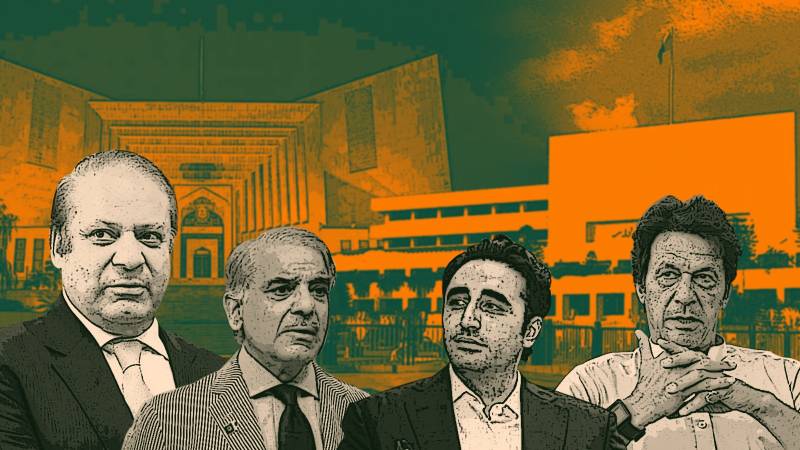
The dynasts have indeed outdone themselves, through general elections that have been dubbed by most independent observers as the most controversial in the already erratic electoral history of Pakistan. Despite their sixteen-months of incompetence and the most unsuccessful government, and Tehreek-e-Insaaf’s narrative of victimization, they manoeuvred polling results to their advantage. The dynasts are firmly placed in three provinces, and hold nearly a two-thirds majority in the federal government. The process of returning to the old Pakistan, which began two years ago with the overthrow of the PTI government, has reached its logical conclusion, marked by restrictions on freedom of expression, the pursuit of political vendettas, and restrictions that have sought to exclude the former ruling party from the electoral process entirely.
How this government will sustain itself in power is a puzzle that needs to be solved now. The economy is in shambles, society is divided, and democracy lies wounded. The responsibility for helping the nation emerge from this quagmire lies squarely on the shoulders of the same dynasts who own the blame for it.
Subject the dynastic leadership's performance during their brief tenure in the previous government to scrutiny makes it abundantly evident that they were unable to overcome many of the challenges in addressing critical issues. The economy, compelled by the need for repeated IMF loans, must now be run not in the interests of the nation, but to adhere to lenders’ stringent conditions. Their repayment strategy involves increasing taxes on the poor and middle classes, while concurrently removing subsidies on essential commodities. Furthermore, pivotal public services such as education and health are undergoing a transition to private sector management.
Post-Musharraf era civilian governments have perpetuated the practice of devaluing the national currency during market downturns and raising interest rates. These actions adversely impact ordinary citizens, as the former leads to a squeeze on their wallets and the latter reduces job opportunities given smaller businesses' low prospects of securing loans from banks.
Despite controlling a significant share of the country's resources, the dynasts and their cronies contribute less than thirty percent in taxes, underscoring the need for a more inclusive tax net. Economic transformation hinges on simultaneous increases in production rates and people's purchasing power.
An alternative avenue for wealth redistribution, as identified in the Constitution, involves establishing a system of local governments operating independently in the economic, political, and administrative realms. Crucial sectors such as education, health, sanitation, recreation, and social welfare should fall under the jurisdiction of these governments, with a suggested allocation of a minimum of seventy percent of the provincial budget.
However, the dynasts staunchly oppose this decentralized approach, making concerted efforts to withhold power and resources from grassroots levels. The flow of resources from the federation to the provinces is deliberately hobbled.
The area between Lahore, Peshawar, Quetta, and Karachi is a large region outside the circle of development and prosperity. On the one hand, there are obstacles to the creation of new provinces; while on the other hand, the dynasts are opposed to the devolving power and resources to lower levels of government.
Consequently, the inaction of local governments allows political parties to evade public pressure, trapping them in the influence of mafias, and jeopardizing the stability of democracy through increased inequality and the complete lack of inclusive development.
Another critical consideration is the concept of human dignity, which serves as the bedrock of democracy and national unity. The legal framework inherited from the British era undermines this by design, constraining freedom of thought. The dynasts, upholding colonial legacies, cultivate an atmosphere of fear and intimidation, deterring investment and creating societal divisions.
Recently, this outdated legal framework and its violent and coercive tactics have been deployed in full force against the former ruling party. The dynasts have positioned themselves against the 'national' interest, prioritizing their privileges over the rule of law, and adhering to a throne-and-table policy. They perceive democracy solely as a means to safeguard their own privileges, resisting anything beyond that as chaos.
There are millions of reasons for the dynasts not to do anything positive in the presence of the most robust opposition party in history, which despite innumerable obstacles and being subject to state coercion, has returned as the single largest party in the lower house, and is also in power in Khyber Pakhtunkhwa.
The People's Party, which was once left-leaning but now champions dynastic interests, seems to be the clearest benefactor from the ongoing conflict between the PML-N and the PTI. If it persists quietly and bides its time, and remains committed to power-sharing with the PML-N, then that might just signal the imminent end of dynastic governance, although its expiration date remains uncertain.

